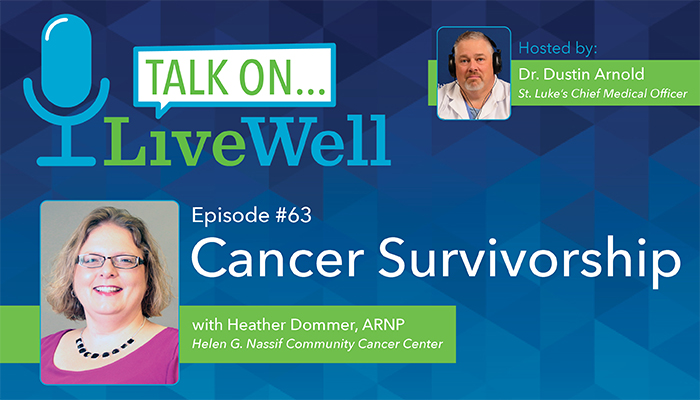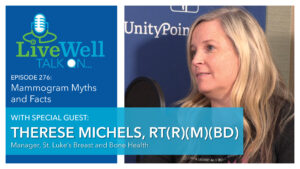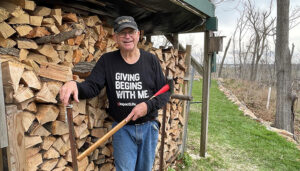Heather Dommer, Survivorship Nurse Practitioner, joins Dr. Arnold to discuss cancer survivorship and the wide range of services available to survivors at the Helen G. Nassif Community Cancer Center.
Subscribe on: Apple Podcasts | Google Podcasts | Spotify | iHeart Radio | Pandora | SoundCloud | Stitcher | TuneIn
Host
Dr. Dustin Arnold
Chief Medical Officer
UnityPoint Health – St. Luke’s Hospital
Guest:
Heather Dommer
Survivorship Nurse Practitioner
Helen G. Nassif Community Cancer Center
Transcript
Dr. Dustin Arnold: This is LiveWell Talk on Cancer Survivorship. I’m Dr. Dustin Arnold, Chief Medical Officer at UnityPoint Health St. Luke’s Hospital. Survivorship is so much more than just surviving a cancer, it involves living with it, through it, and beyond it. The Helen G. Nassif Community Cancer Center offers the only dedicated survivorship clinic in the area. Designed to help you through every step of your survivorship journey, regardless of when or where you were treated. Here to tell us more about this program is Heather Dommer, a survivorship nurse practitioner at the community cancer center. Welcome.
Heather Dommer: Thank you.
Dr. Dustin Arnold: You know, when you think survivorship, what is it?
Heather Dommer: Well, a patient is considered a survivor from the time of diagnosis until the end of their life. So our goal at the survivorship clinic is really to make that time as good as can be, as healthy as a person can be, as well as they can be. So it really encompasses a lot of different activities that we do and keeping patients as well as they can be during that time.
Dr. Dustin Arnold: Now, this question may sound petulant on some level, but it’s not intended to be, but if I have a basal cell cancer removed from my ear, from a sun exposure, let’s say, is that considered survivorship? I mean, it is a cancer, but it’s pretty limited and my life wasn’t threatened by it.
Heather Dommer: It’s definitely considered survivorship. So a patient would definitely be welcome in our center…
Dr. Dustin Arnold: Okay. So you wouldn’t say, “your cancer wasn’t severe enough?”
Heather Dommer: No, we would never say that. However, it’s not something that I typically do see on a regular basis.
Dr. Dustin Arnold: I’m sure most people that… like I said, it was kind of a petulant petty question, but I was just curious.
Heather Dommer: Right. No, yeah, definitely. They would be welcomed at the cancer center and we would want them to participate in the services that we offer, but it’s not something that I would actually sit down and do a full visit for.
Dr. Dustin Arnold: What’s the longest you’ve had someone in your program?
Heather Dommer: Well, I’m pretty new, so hard to answer that question. I’ve only been here for about a year and a half. So I’m not, I know that it’s been going on longer than I’ve been here.
Dr. Dustin Arnold: Okay, yeah.
Heather Dommer: So I can’t really answer that question real well, because I’m not sure. But I know there’s been a couple other nurse practitioners before me who started the survivorship clinic.
Dr. Dustin Arnold: It usually, in Oncology, and from my perspective, we talk about five year survival rate. In lung cancer, five year survival rate, colon cancer, five year survival rate. I really can’t tell you why the five years is there. Don’t know. But that’s kind of a standard metric for measurement. It’s like people get back five years. It’s still pretty good that it’s probably not back or they have survived, of course. So, have you heard or seen people drop off after five years or is that something that the patients follow in their participation as well?
Heather Dommer: Well, I actually have two different roles as a survivorship nurse practitioner. The first role is that I do survivorship care plans for every cancer, almost every, cancer patient that we see here between PCI and UnityPoint. So as soon as they complete at least their first phase of treatment, they come to me and we sit down and go through their diagnosis, their treatment information. We talk about, follow up, who’s going to do what, what kind of signs and symptoms they need to be watching for, and also side effects that can occur even down the road from the treatment that they’ve had. Then we finally talk about all the services that we offer and I do referrals of what I think they could benefit from. That’s the first part. So after that, they usually go back to their physician to be followed for however long: five, 10 years, for cancer surveillance. The second part that I do, is once they’ve been out, five to 10 years, and haven’t had any problems or any recurrence. Then a lot of times the oncologist will refer them back to me at a later time to do further follow-up because the oncologists need to be there to take care of the patients that need the treatment, the new diagnosed ones.
Dr. Dustin Arnold: Right, right right.
Heather Dommer: So I’m there to kind of help out, um, for the patients that are out farther. And then we usually say, most of those are breast cancer patients that I take care of right now but it can be lymphoma.
Dr. Dustin Arnold: Is that the most common cancer in your clinic, Heather?
Heather Dommer: Breast and prostate.
Dr. Dustin Arnold: Breast and prostate.
Heather Dommer: Yeah.
Dr. Dustin Arnold: Okay.
Heather Dommer: Are the two most common.
Dr. Dustin Arnold: Which are some of the most common cancers that of course…
Heather Dommer: Right, of course.
Dr. Dustin Arnold: Stands to make sense. So what is the goal of survivorship? I mean, they’ve survived, so that’s check that’s off the list. That’s good. What are the goals beyond that?
Heather Dommer: So there’s lots of different goals, and actually it’s really personal for the patient, what their goal is. My goal as a provider is to go through those things that I just mentioned before. My goal is so that they have something written. They go home with a piece of paper that has everything down: their diagnosis, their stage, what their tumor looked like, what their surgery was, if they had chemo, if they have everything written down. So if they ever need to go somewhere else for care, they have that in their hand, those records. And it’s nice, even just within our own community, we have several different medical records. So it’s nice for all of those places to be on the same page on what we’re doing. Then the second thing is, the family doctor sometimes struggles with where they fit into this whole thing. The care plan also gives the family doctor an idea of what they need to be continuing to follow and what the oncologist is following.
Heather Dommer: It’s nice for them to know everything’s written out exactly. You’re doing this and I’m doing this. It’s very helpful in that way. The other side of the coin for the patient is those long-term side effects that can occur. There’s lots of side effects that can occur and some of them are not just physical, definitely emotional side effects too. It’s also important to sit down with the patient and see what their goals are, how they see the rest of their life going forward, their future, and what is important to them and what kind of services we can offer to help get them to that goal. I know there’s a catchphrase for everything right now, “This New Normal”. I’ve been saying that for a long time, even before COVID, but cancer patients do have to find that new normal for them. They’re living with the diagnosis, sometimes long-term, or they’re living with a fear of the recurrence of cancer. It’s really a goal to find what works best for that patient.
Dr. Dustin Arnold: That’s an interesting you say that. We had a podcast within recent days on post traumatic stress disorder. I did learn during that podcast or confirmed my suspicion that your post-traumatic stress disorder is not the same as mine.
Heather Dommer: That’s right.
Dr. Dustin Arnold: The event that sets that off. So I imagine that there are some people or patients that are really affected by the diagnosis of cancer and survivorship, and others that are kind of hands-off, carefree about it and it doesn’t really affect them. They just move on, or at least we don’t see the effects. This is a tough question to ask. We kind of chatted about it before we started the podcast, but so I imagine there are some patients that become consumed by it. They become their colon cancer and there are other patients that completely deny that they have it. It’s quite a spectrum. How do you balance those two? Between participation and consumption, how does that work?
Heather Dommer: That’s a good question. Everybody is different. As we know, as providers, everybody has to kind of find their niche. One of the things that we do, in the cancer center, is we do a screening tool as soon as they come to the meeting.
Dr. Dustin Arnold: First visit.
Heather Dommer: Yeah, first visit. It lists all the concerns that we think maybe they might be concerned about and then they check them off. They tell us what they’re concerned about. Then I’d really try and focus on those concerns. Again, what the services are that can help them with those concerns. The fear of recurrence is typical for most patients. We usually talk about that quite a bit because I don’t think there’s anyone who doesn’t have that fear at some level. I think it’s important to talk about that with patients and one of the things that I talk about with them is having someone to talk to, a support person. And if they can’t find someone to talk to to get those feelings out, a journal is another good way of getting those ideas and feelings out on a piece of paper to write it down. It’s not healthy and not a good idea to squander those feelings down and that can actually make things worse. That’s one of the things that we do talk about too, is that they should let those feelings out and talk to others about it.
Dr. Dustin Arnold: If that’s the first visit where you develop that coordinated treatment plan between the oncologist, the patient and the family practitioner and yourself. Which I think that illustrates coordinated care is not just simply coordinated scheduling where they all visit each day. That’s not coordinated care. Coordinated care is actually determining between two or more individuals, including the patient, about what the plan is and what everyone’s role is, you know? I think that’s excellent.
Heather Dommer: Yeah.
Dr. Dustin Arnold: I really enjoy hearing that. But so that’s the first visit, when do I see you again? And how often do I see you? And, what are those visits like?
Heather Dommer: Yeah. So the majority of patients just see me the one time and then they go back and see their family doctor… I’m sorry, their oncologist for the cancer surveillance. Or for prostate patients, a lot of times, it’s their urologist who follows it. So their primary specialist care, who’s doing the cancer treatment, okay. They’re the ones who actually do the follow-up because they need close follow-up with their labs and their surveillance. Whence they’ve been out five to 10 years. Again, it really depends on the oncologist, it’s up to them when they feel that the patient is stable enough that they can come back to me. Sometimes they do, not everyone does. So the majority of the people that I see is just the one visit.
Dr. Dustin Arnold: Oh, interesting.
Heather Dommer: Yeah.
Dr. Dustin Arnold: So it kind of established the treatment plan?
Heather Dommer: Yeah. Dr. Dustin Arnold: But the door is open if they…
Heather Dommer: Of course! Dr. Dustin Arnold: …if they need to see you again, that’s possible?
Heather Dommer: Yes.
Dr. Dustin Arnold: Well, speaking of that door, how does, how does one get an appointment? Is it a referral from oncologist? Could I just call you up if I’m a cancer survivor and say, “I need some help?” How does that work?
Heather Dommer: Yeah, so the oncologists do refer and so does both, the medical oncologist and the radiation oncologist, refer patients to me. But yes, you can also call up and get an appointment. It doesn’t matter where you had your treatment at either. It doesn’t have to be through UnityPoint. It can be through the university or through Mercy. We welcome anyone who’s had a cancer diagnosis. They can call me up or they can call the front desk and make the appointment…
Dr. Dustin Arnold: Sure.
Heather Dommer: …but the majority of it is referrals.
Dr. Dustin Arnold: Okay. Alright. Interesting. What have you seen change? You talked about this new normal, with COVID, how has COVID affected the practice? I’m sure, perhaps, a little less attendance. Patients would be at higher risk, right?
Heather Dommer: Right. Yes.
Dr. Dustin Arnold: They’ve had cancer. They survived it.
Heather Dommer: Yep.
Dr. Dustin Arnold: So not smart for them to go out and about.
Heather Dommer: Yeah. Especially the ones that have been newly treated.
Dr. Dustin Arnold: Right.
Heather Dommer: They’ve been treated with chemo. They’re definitely immunosuppressed.
Dr. Dustin Arnold: Right.
Heather Dommer: So, a lot of our services were temporarily suspended during the majority of the COVID. So exercise classes, group classes, massage therapy, we have acupuncture therapy, most of those were suspended at least for a couple of months. But the good news is, is that we’re starting to ramp things back up. Massage is opened up and acupuncture is opened up. Our exercise specialist is doing one-on-one appointments with patients for exercise but we’re not quite all the way there yet. We’re going to, hopefully, open up the group appointments in July.
Dr. Dustin Arnold: Okay.
Heather Dommer: And do the group exercise and stuff.
Dr. Dustin Arnold: Shoot for July?
Heather Dommer: Yeah. Mhmm. There has been some other online stuff that we’ve done. Some yoga classes that they recorded online or the Facebook page and they’re talking about doing some meditation too.
Dr. Dustin Arnold: Oh, like streaming or whatever it’s called?
Heather Dommer: Yeah, exactly. So that’s been nice.
Dr. Dustin Arnold: One last question, how did you end up in this survivorship role? Why did you choose this?
Heather Dommer: Well, I’ve been a nurse…
Dr. Dustin Arnold: It’s okay to say, “it’s the only job you could get”, too.
Heather Dommer: [Laughter]
Heather Dommer: I’ve been a nurse for quite a few years, about 15 years. I went back and got my nurse practitioner degree about three years ago. During the time that I was getting my nurse practitioner degree, my mother became ill with cancer.
Dr. Dustin Arnold: So a little personal influence here?
Dr. Dustin Arnold: Yeah. There’s a large personal influence here. As we like to say here at St. Luke’s, “we like to give the treatment that we’d like our loved ones to receive.” My mother passed away…
Dr. Dustin Arnold: I’m sorry to hear that.
Heather Dommer: …From her cancer. But her memory lives on through me and I feel like I can really give the care that I think my mother would’ve wanted if she was still here.
Dr. Dustin Arnold: That’s impressive, Heather. That’s inspiration right there for the day.
Heather Dommer: Yeah.
Dr. Dustin Arnold: Thanks Heather for stopping by again. This was Heather Dommer, survivorship nurse practitioner, at the Helen G. Nassif Community Cancer Center. For more information, visit communitycancercenter.org/clinics/survivorship/.







